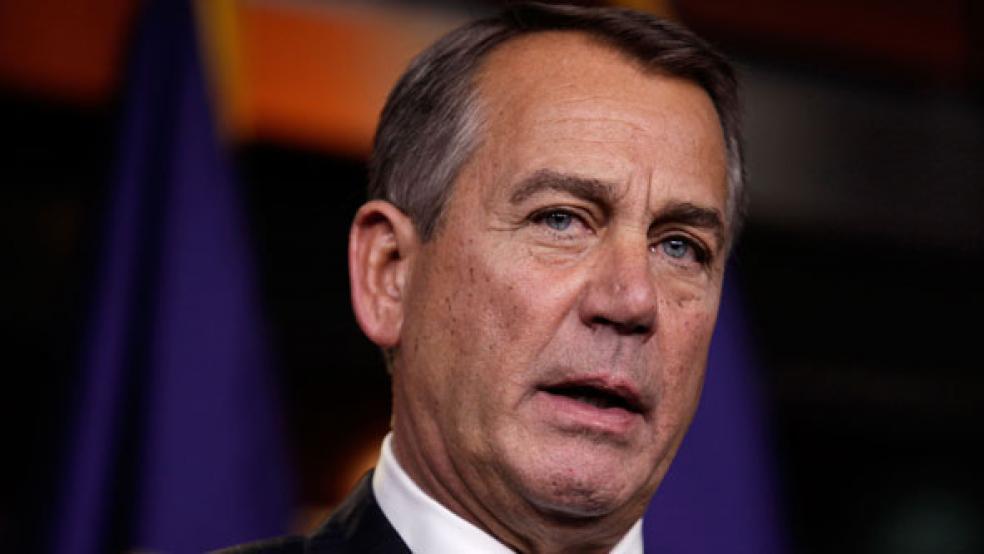The House now looks primed to approve Republican Speaker John Boehner’s “Plan B” measure to extend Bush-era tax cuts for incomes up to $1 million. The vote is scheduled to take place late this evening and could give the speaker added leverage in negotiating a year-end budget and tax deal with President Obama.
Over the past 24 hours, Boehner and his lieutenants have pressed rank-and-file members to fall in line behind a measure that many of them initially dismissed because it would effectively raise top tax rates on millionaires to nearly 40 percent yet do nothing to address their concerns about automatic cuts in defense spending set to take place in January unless Congress intervenes.
House Majority Leader Eric Cantor, R-Va., declared Thursday afternoon that the leadership had rounded up at least the 218 votes needed for passage, after Republican leaders incorporated a proposal to spare the Pentagon from looming spending cuts and shift the reductions to other agencies.

“Senate Democrats should take up these measures immediately,” Cantor told reporters at the Capitol. “And the president has a decision to make. He can support these measures, or be responsible for reckless spending and the largest tax hike in American history.”
Boehner called in many chits on the gamble that he could both improve his negotiating position with the president and inoculate House Republicans from criticism that they were willing to take the country over the fiscal cliff. Scores of newly elected House Republicans are beholden to the speaker, who raised an astounding $84 million in campaign funds during the 2012 election cycle to keep control of the House in GOP hands.
Many Democrats fear Plan B is a move to derail the negotiations. The White House charged yesterday that as drafted, Plan B would continue large tax cuts for the very wealthiest individuals because of the marginal rate system. On average, millionaires would see a tax break of $50,000 on their income below the seven-figure threshold. Meanwhile, the measure would eliminate important tax incentives and breaks for businesses as well as for 25 million students and their families
Some Democrats speculated that Boehner chose to push for his alternative plan just when he and Obama appeared to be closing in on a major long-term deficit reduction package because he realized he couldn’t convince his members to go along with $800 billion to $1 trillion of new tax revenues.
“Clearly, the Republicans know that what they are doing today is simply a waste of time,” said House Minority Whip Steny Hoyer, D-Md., “What we’re doing today is wasting time pretending, making political points but not moving the ball forward to get to a compromise that will be necessary if we're going to avoid the sequester that nobody wants, not go over the cliff, and take very positive steps toward getting this country on a fiscally sound path.”
Senate Majority Leader Harry Reid, D-Nev., and fellow Democrats insisted they wouldn’t schedule a vote on Boehner’s fall-back plan or try to amend it. They demanded that Boehner return to the negotiating table with Obama. They said the only fiscal cliff deal that could move forward is one negotiated by Boehner and the president.
“We are not going to do it and the speaker needs to hear from you and every journalist in this room,” Reid told reporters. “Let him get serious. He’s not serious now.”
Conservative groups, including Heritage Action for America and the anti-tax Club for Growth, are warning lawmakers not to vote for Boehner’s plan.
“The bill is anti-growth,” Club for Growth’s vice president of government affairs, Andy Roth, wrote in a letter sent to Capitol Hill Wednesday, adding that the group will score how lawmakers vote on the bill.
Yet Americans for Tax Reform, another anti-tax group led by activist Grover Norquist, said earlier Wednesday that the Boehner proposal does not violate a pledge signed by many Republicans to never raise taxes.
Many conservative lawmakers uneasy about Plan B nonetheless appeared to be ready to hold their noses and cast votes to pass the measure.
“What we’re trying to do is to protect as many taxpayers as possible from tax increases,” said Patrick Tiberi, R-Ohio. “If we don’t do anything, taxes go up. It’s different when you have to govern and not be pure in what you say. Do I like the situation I’m in? No. But I’ve got to play the hand dealt to me.”





